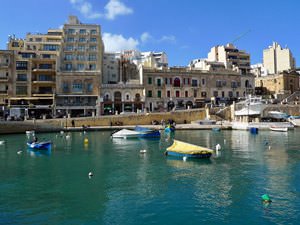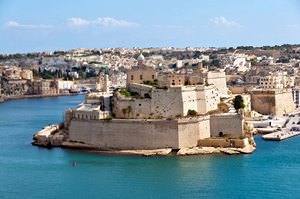
Malta is a democratic republic. The state legislation is based on the Constitution, which was adopted in the middle of the last century. Ever since its adoption, it has only undergone review twice. Until 1974, Malta was part of the British Commonwealth of Nations and had rather limited rights. However, in December of the same year, the country received a partial independence (the country gained full independence only five years later). Since then, Malta has been a free Republic headed by a President. The President is however not elected by locals, but by the Parliament. The term of the President is 5 years. It is worth noting that the President is a full representative of the state of Malta in the international arena, and he also in addition occupies the office of commander-in-chief of the Armed Forces of the country.
Malta is great for a family holiday - clean sea, safe resorts, mild climate will make the vacation delightful. On the islands, except for the beaches, …
Read further
The highest legislative body is the Parliament. In Malta, it is called the House of Representatives. It is worth noting that this Parliament has a unicameral structure. Each member is re-elected every five years. To date, the House of Representatives has about 70 deputies, with only 65 of this number taking up office on the basis of victory in the elections. The rest of the members that make up the parliament on the other hand, get to their posts only if the opposition party almost completely overtook the other party that is in power. If this does not happen and the gap between the ruling party and the losing one is more than 15 percent, then the parliament is made up of only 65 deputies, and no one gets there from the opposition party.
It should be noted that there are only two political parties in Malta. They are; the Nationalist Party of Malta and, accordingly, the Labor Party. Such a bipartisan system as this, despite its rather outdated structure, still maintains its relevance in Malta today. It also has not been known to cause any internal outrage among the local population. All this aside, the formation of new political units is not illegal. For example, today there are several more political parties on the Islands, but their influence on public and political life is so insignificant that all political scientists of the world still continues to consider Malta as a bipartisan republic. Moving on, about forty trade unions exists in the territory of the country today. At the same time, more than half of the population belongs to the association of unskilled workers. Copyright www.orangesmile.com
Shopping in Malta is not a priority for recreation, but the country offers excellent opportunities for combining beach and sightseeing with shopping …
Read further
The main body of executive power is the Council of Ministers. At its head is the Prime Minister, whose candidacy is personally approved by the President himself. Although, on the other hand, the appointment of the Prime Minister is a formality. For many decades in a row, the Prime Minister is, in fact, the one who belongs to the leading party, which has won the elections. The Cabinet of Ministers is formed by the Prime Minister. However, the President must make his own decision on any candidate nominated to the position. This is because he has the right to challenge the opinion of the Prime Minister on any individual candidate. To date, Malta’s foreign policy is focused on creating a peaceful coexistence as well as friendly relations with all the neighboring countries.
![Fort St. Angelo Fort St. Angelo]()
At the same time, Malta has been trying to enter the Eurozone since the nineties and for the past 15 years has been actively acquiring a fairly stable position in the European Union. In addition, Malta actively participates in the work of the OSCE mission, and is also included in the group of chief advisers of the European Council. Although Malta is one of the smallest republics in Europe, due to her complete independence and declared neutrality, she has her own Armed Forces. They include air, land, as well as naval forces. To date, military expenditures for the maintenance of the internal armed forces of Malta account for about 2% of the total GDP. At the same time, all men aged between 15 and 49 years are considered fit for military service in the State. The Maltese police are responsible for the organization of local order.
 Malta is a democratic republic. The state legislation is based on the Constitution, which was adopted in the middle of the last century. Ever since its adoption, it has only undergone review twice. Until 1974, Malta was part of the British Commonwealth of Nations and had rather limited rights. However, in December of the same year, the country received a partial independence (the country gained full independence only five years later). Since then, Malta has been a free Republic headed by a President. The President is however not elected by locals, but by the Parliament. The term of the President is 5 years. It is worth noting that the President is a full representative of the state of Malta in the international arena, and he also in addition occupies the office of commander-in-chief of the Armed Forces of the country.
Malta is a democratic republic. The state legislation is based on the Constitution, which was adopted in the middle of the last century. Ever since its adoption, it has only undergone review twice. Until 1974, Malta was part of the British Commonwealth of Nations and had rather limited rights. However, in December of the same year, the country received a partial independence (the country gained full independence only five years later). Since then, Malta has been a free Republic headed by a President. The President is however not elected by locals, but by the Parliament. The term of the President is 5 years. It is worth noting that the President is a full representative of the state of Malta in the international arena, and he also in addition occupies the office of commander-in-chief of the Armed Forces of the country.
 At the same time, Malta has been trying to enter the Eurozone since the nineties and for the past 15 years has been actively acquiring a fairly stable position in the European Union. In addition, Malta actively participates in the work of the OSCE mission, and is also included in the group of chief advisers of the European Council. Although Malta is one of the smallest republics in Europe, due to her complete independence and declared neutrality, she has her own Armed Forces. They include air, land, as well as naval forces. To date, military expenditures for the maintenance of the internal armed forces of Malta account for about 2% of the total GDP. At the same time, all men aged between 15 and 49 years are considered fit for military service in the State. The Maltese police are responsible for the organization of local order.
At the same time, Malta has been trying to enter the Eurozone since the nineties and for the past 15 years has been actively acquiring a fairly stable position in the European Union. In addition, Malta actively participates in the work of the OSCE mission, and is also included in the group of chief advisers of the European Council. Although Malta is one of the smallest republics in Europe, due to her complete independence and declared neutrality, she has her own Armed Forces. They include air, land, as well as naval forces. To date, military expenditures for the maintenance of the internal armed forces of Malta account for about 2% of the total GDP. At the same time, all men aged between 15 and 49 years are considered fit for military service in the State. The Maltese police are responsible for the organization of local order. 

